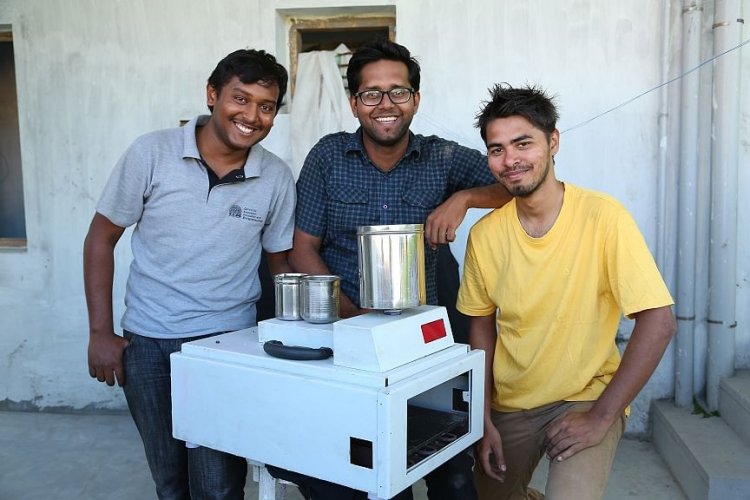Mukunda Dishes- Automated Kitchen
Mukunda Dishes is an automated kitchen located in Bengaluru. Founded in 2012 by SRM University grads Eshwar K. Vikas and Sudeep Sabat, is on a quest to streamline the production of Indian foods, according to Eshwar.

Mukunda Foods has never been busier than it is today, as contactless goods have become more popular as a result of the COVID-19 epidemic.
They develop machines that produce a variety of foods without the need for human interaction. COVID-19 is paving the road for a contactless world. Businesses are recognising that utilising technology is the key to expecting any type of success since the start of COVID-19. In reality, it has increased the rate at which firms, particularly small and medium-sized enterprises, embrace technology.
This also implies that India is bringing in a new revolution, known as Industry 4.0, which is characterised by the utilisation of technologies such as the Internet of Things (IoT), connectivity, machine intelligence, machine learning, automation, sophisticated engineering, and more. Factory robotics is one of the most recent advancements in the Indian manufacturing business. Industry is increasingly focusing on cost-effective manufacturing processes, which has resulted in increased factory automation. Mukunda Foods, located in Bengaluru, is one of the firms that has succeeded to upset the FMCG market with its automation technologies.
The adventure
Sudeep and Eshwar established Mukunda Foods in Bangalore as a chain of quick-service restaurants (QSRs) that produce and sell several types of dosas. Eshwar recalls that automation was not even on the table. After launching their third location, however, they began to have difficulties such as workers not showing up or the chef taking too many leaves. This harmed the quality and consistency of the meals, as well as increasing consumer complaints and reducing earnings. This is when Sudeep and Eshwar planned to automate their culinary procedures using technology. Having a foundation in engineering aided in dealing with the difficulties. According to Eshwar, the company's initial product, DosaMatic, was created for Mukunda's own outlets. Several restaurant owners eventually took notice and began placing orders for this equipment. DosaMatic got known in Bangalore for "automatically producing dosas." The co-founders decided to move away from the QSR business model and focus on producing and selling these devices as the orders rose.
Later, they developed and created more devices (such as RiCo, Eco Fryer, and Wokie) to automate the preparation of a variety of various cuisines, including Chinese, North Indian, American, and more. The Indian Angel Network quickly fostered Mukunda Foods (IAN). The firm graduated from the incubator in 2013, and IAN investors Hari Balasubramaniam and P Gopinath led an investment phase. In 2018, the firm received investment from Ncubate Capital Partners, the venture capital branch of the Gurugram-based SAR Group. It has raised a total of Rs 40 crore. The machines were approximately Rs 50,000 when they were first released. They are now available for Rs 1.5 lakh.
Increasing efficiency
In today’s hyper world, company owners have realised that, in order to assure customer happiness, production innovation is just as vital as final product innovation. Customisation, according to Eshwar, has been the most difficult task so far. Even after a meal is finished, manual cooking allows a person to add ingredients or fill in the gaps. But how can you give a machine that operates on predefined pattern instructions to customise? This is where hiring was crucial: finding the appropriate people to assist the team in making the most use of technology. Bangalore is home to several R&D centers and facilities.
Today, these machines provide a variety of options to accommodate a customer's various tastes. For example, the DosaMatic machine provides over 50 dosa types, ranging from crispy variants to uthappams - there are lots of alternatives. Brands that are struggling to make a profit might benefit greatly from automation. They will be able to develop their enterprises tremendously while remaining profitable if they use automation.
ITC, Rebel Foods, Wow Momos, Chaayos, The Bowl Company, and other well-known brands are among Mukunda Foods' B2B clients today. So far, over 3000 machines have been placed throughout India, as well as the United Kingdom, the United States, Australia, and Singapore.
Mukunda is also working on an agreement to deploy this equipment with two multinational food firms. Additionally, in order to expand further into foreign markets, it plans to open demo centers in places where it currently operates. Mukunda is now implementing a new business model, Kitchen as a Service, to complement its existing one (KaaS). The business hopes to supply restaurant operators with fully controlled automated cloud kitchens using this concept (including installation of machinery and one person to manage it). By the conclusion of this fiscal year, Eshwar says they want to have 50 of these options available in the market.
Address: Near SRS Travels, Bommanahalli, Popular Colony, Mangammanapalya, Bengaluru, Karnataka 560068
Contact: 080884 96555
Appointments: https://dosamatic.mukundafoods.com/LiveDosaMaticDemo


 Local BangaloreTeam
Local BangaloreTeam 










